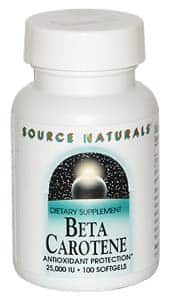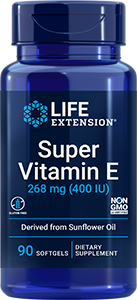 |
| September 07, 2004 | Printer Friendly | |
| |
 |
| Life Extension Update Exclusive Vegetables, supplements lower ovarian cancer risk
A case-control study reported in the September 2004 issue of the journal Cancer Epidemiology, Biomarkers & Prevention has found an inverse association between the risk of developing ovarian cancer and the intake of vegetables and supplements of beta-carotene, B complex and vitamin E. Researchers from Ottawa, Ontario administered health history and dietary questionnaires to 442 women diagnosed with ovarian cancer and 2,135 age-matched women who were cancer free. Intake levels of foods and nutritional supplements for the two years preceding the study was analyzed by the researchers, and the groups were compared. In this study, women with ovarian cancer were more likely to be postmenopausal, to be obese, to have consumed more calories, to have had fewer births and to have lower physical activity levels than those without the disease. When diet was examined, no associations were found between ovarian cancer and intake of fat, protein, carbohydrates, and many other dietary components. Cholesterol and egg intake was associated with an insignificant increase in ovarian cancer risk. Women whose total vegetable intake and cruciferous vegetable intake was in the top 25 percent of participants experienced a risk of ovarian cancer that was almost one-fourth lower than those whose consumption was in the lowest quarter. When supplements were examined, women who took beta-carotene for over ten years had a risk of ovarian cancer that was 69 percent lower than those who did not report using the supplement. Vitamin E supplementation for the same period of time halved ovarian cancer risk. B-complex vitamins were associated with a smaller decreased risk. The authors attribute the vitamins’ cancer preventive ability to their antioxidant capacity which helps prevent DNA damage, and note that vitamin E and beta-carotene also improve immune function. They recommend further study of B-complex’s apparently less significant protective effect to confirm the current study’s findings. |
 |
| Protocol Cancer adjuvant therapy
The inhibitory role of vitamin E in the growth of a number of human tumor cells, as well as its defensive functions in overcoming treatment-induced toxicity have been examined. The impact of vitamin E (perhaps acting through its antioxidant strengths) is significant, as evidenced by the following studies: - After examining 29,000 male smokers in Finland, researchers found that high blood levels of alpha-tocopherol reduced the incidence of lung cancer by approximately 19%. The relationship appears stronger among younger persons and among those with less cumulative smoke exposure. These findings suggest that high levels of alpha-tocopherol, if present during the early critical stages of tumorigenesis, may inhibit lung cancer development (Woodson et al. 1999).
- A combination of vitamin E and pentoxifylline (PTX), a drug that inhibits abnormal platelet aggregation, allowing more blood to reach irradiated areas, resulted in a 50% regression of superficial radiation-induced fibrosis (the proliferation of fibrous connective tissue) in half of the patients studied (Gottlober et al. 1996; Delanian 1998). A suggested dosage is 800 mg a day of PTX and 1000 IU per day of vitamin E.
- An antimelanoma effect obtained from vitamin E succinate in vivo has been reported (Malafa et al. 2002).
- Gamma-tocopherol inhibits COX-2 activity, demonstrating anti-inflammatory properties (Jiang et al. 2001; Life Extension Magazine 2002).
- The use of vitamin E, in combination with vitamins A and C, led to a four-fold reduction in p53 mutations (Brotzman et al. 1999). This is an extremely important finding because p53 mutations indicate a more malignant, aggressive form of cancer.
- Men with a high intake of vitamin E are 65% less likely to develop colorectal adenomas (precursors to colon cancer) compared to men with low vitamin E intake (Tseng et al. 1996).
- Lower morbidity and mortality from prostate cancer in men taking 50 mg of synthetic alpha-tocopherol daily. Subsequent testing determined gamma-tocopherol to be superior, however, to alpha-tocopherol in terms of tumor cell inhibition (Moyad et al. 1999). Men in the highest fifth of the distribution for gamma-tocopherol had a five-fold reduction in the risk of developing prostate cancer compared to those in the lowest fifth. In addition, statistically significant protection from high levels of selenium and alpha-tocopherol occurred only when gamma-tocopherol concentrations were also high (Helzlsourer et al. 2000). Vitamin E's mode of efficacy in regard to prostate protection: Vitamin E interferes with two proteins (the receptor for testosterone and prostate-specific antigen [PSA]). The fewer androgen receptors there are on a prostate cancer cell, the less capable the remaining receptors are of turning on genes that stimulate prostate cancer growth and progression. PSA serves as a good marker molecule for androgen receptor activity (Mercola 2002b).
- Tocotrienols, quite similar to a tocopherol (but for the addition of an unsaturated tail in its chemical structure), accumulate in adipose tissues, including mammary glands. If a cell becomes diseased, the tocotrienol is prepared for action, ready to inhibit growth and regulate aberrant cellular activity at onset. Curiously, the more cancerous the cell, the more susceptible it is to tocotrienols. Scientists apparently have been focusing upon the wrong form of vitamin E (the tocopherols), which show little protection against breast cancer. Tocotrienols appear to inhibit proliferation of human breast cancer cells by as much as 50% (Nesaretnam et al. 1998). Results suggest that tocotrienols are effective inhibitors of both estrogen receptor-negative and estrogen receptor-positive cells and that combination with tamoxifen should be considered as a possible improvement in breast cancer therapy. This strategy could significantly reduce the amount of tamoxifen required to affect the cancer (Guthrie et al. 1997).
- Cortisol (associated with poorer survival) and IL-6 (a negative marker for various cancers) were significantly lower in laboratory animals that received alpha-tocopherol before a cortisol-IL-6 challenge (Webel et al. 1998).
|
 |
| Featured Products
Beta-carotene capsules Beta-carotene is the most potent precursor to vitamin A, but its conversion to vitamin A in the body is limited by a feedback system. It is an important antioxidant in its own right and one that can only build up to toxic levels in rare circumstances. Beta-carotene helps support immune health by enhancing the function of the thymus gland.
Beta-carotene is an important antioxidant that also serves as an on-demand precursor to vitamin A.
Vitamin E capsules One or more members of the vitamin E family may: - Maintain cell membrane integrity and reduce cellular aging.
- Inhibit the potentially damaging peroxynitrite radical.
- Maintain healthy platelet aggregation.
- Synergize with vitamin A to protect the lungs against pollutants.
- Protect nervous system and retina.
- Delay cognitive decline.
- Enhance immune function.
|
 |
| Apply for your Life Extension Platinum Plus Mastercard and help fund antiaging research! As a Life Extension customer, you are committed to our ongoing search to uncover integrative therapies which prevent and treat many diseases associated with aging as well as aging itself. Now, by simply using your Life Extension MasterCard credit card to make your regular credit card purchases, you can effectively contribute to our cause. Simply use your Life Extension MasterCard, and a percentage of your purchase price will be sent to Life Extension to help us fund the antiaging studies that we use to help us develop our products and services. Issued by MBNA America Bank, the leading issuer of affinity credit cards, this program offers Life Extension members a low introductory annual percentage rate on cash advance checks and balance transfers. Platinum Plus customers may also take advantage of numerous benefits such as fraud protection, supplemental auto rental collision deductible coverage, and up to $1 million in Common Carrier Travel Accident Insurance. https://www.lifeextension.com/lpages/MBNA
|
 |
| If you have questions or comments concerning this issue or past issues of Life Extension Update, send them to ddye@lifeextension.com or call 954 766 8433 extension 7716. For longer life, Dayna Dye
Editor, Life Extension Update
ddye@lifeextension.com
LifeExtension.com
1100 West Commercial Boulevard
Fort Lauderdale FL 33309
954 766 8433 extension 7716 Sign up for Life Extension Update at https://mycart.lifeextension.com/subscribe.asp Help spread the good news about living longer and healthier. Forward this email to a friend! View previous issues of Life Extension Update in the Newsletter Archive. |









